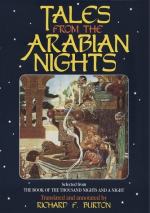my shaft wherewith I shoot and miss not!” Another
tells us, “I stood at the gate of Heaven, and
lo! most of its inmates were poor, and I stood at
the gate of Hell, and lo! most of its inmates were
women.’’[FN#340] “Take care of the
glass-phials!” cried the Prophet to a camel-guide
singing with a sweet voice. Yet the Meccan Apostle
made, as has been seen, his own household produce
two perfections. The blatant popular voice follows
with such “dictes” as, “Women are
made of nectar and poison”; “Women have
long hair and short wits” and so forth.
Nor are the Hindus behindhand. Woman has fickleness
implanted in her by Nature like the flashings of lightning
(Katha s.s. i. 147); she is valueless as a straw to
the heroic mind (169); she is hard as adamant in sin
and soft as flour in fear (170) and, like the fly,
she quits camphor to settle on compost (ii. I7).
“What dependence is there in the crowing of a
hen?” (women’s opinions) says the Hindi
proverb; also “A virgin with grey hairs!”
(i.e. a monster) and, “Wherever wendeth a fairy
face a devil wendeth with her.” The same
superficial view of holding woman to be lesser (and
very inferior) man is taken generally by the classics;
and Euripides distinguished himself by misogyny, although
he drew the beautiful character of Alcestis. Simonides,
more merciful than Ecclesiastes, after naming his swine-women,
dog-women, cat-women,
etc., ends the decade with
the admirable bee-woman, thus making ten per cent.
honest. In mediaeval or Germanic Europe the doctrine
of the Virgin mother gave the sex a status unknown
to the Ancients except in Egypt, where Isis was the
help-mate and completion of Osiris, in modern parlance
“The Woman clothed with the Sun.”
The kindly and courtly Palmerin of England, in whose
pages “gentlemen may find their choice of sweet
inventions and gentlewomen be satisfied with courtly
expectations,” suddenly blurts out, “But
in truth women are never satisfied by reason, being
governed by accident or appetite” (chaps. xlix).
The Nights, as might be expected from the emotional
East, exaggerate these views. Women are mostly
“Sectaries of the god Wuensch”; beings
of impulse, blown about by every gust of passion;
stable only in instability; constant only in inconstancy.
The false ascetic, the perfidious and murderous crone
and the old hag-procuress who pimps like Umm Kulsum,[FN#341]
for mere pleasure, in the luxury of sin, are drawn
with an experienced and loving hand. Yet not
the less do we meet with examples of the dutiful daughter,
the model lover matronly in her affection, the devoted
wife, the perfect mother, the saintly devotee, the
learned preacher, Univira the chaste widow and the
self-sacrificing heroic woman. If we find (vol.
iii. 216) the sex described as:—
An
offal cast by kites where’er they list,




